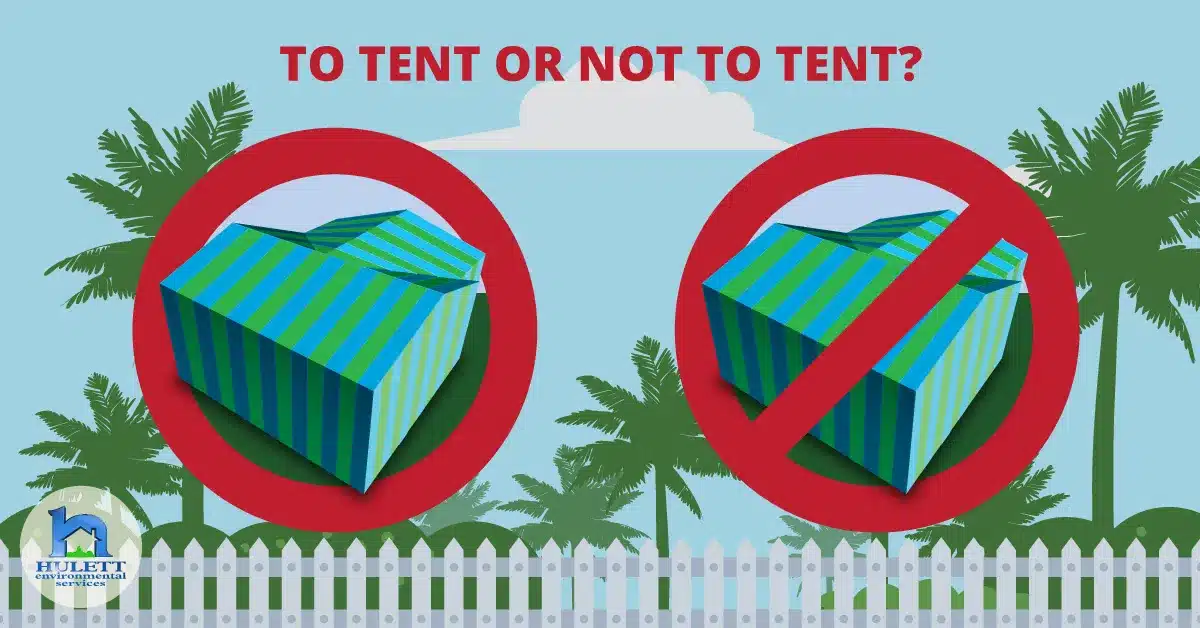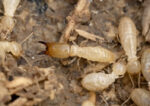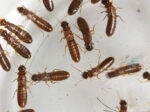
To Tent or Not To Tent?
In South Florida, with moderate temps, high humidity and tropical conditions, termites present a major concern for homeowners. It has been said that, “There are two types of homes in South Florida; those that have termites and those that will have termites.” At least three types of termites cause significant damage to structures in Miami-Dade, Broward, Monroe, Collier and Palm Beach Counties, including drywood, subterranean and conehead termites.
Drywood termite colonies are smaller than subterranean termites
Subterranean and conehead termites are an invasive species that need ground contact to survive. These termites enter your home through ground to wood contact, foraging great distances for food to take back to their nests. Subterranean termites form large colonies with millions of workers who can cause widespread damage supporting their growing populations. Drywood colonies are smaller with infestations usually confined in one location but can consist of multiple nests.
Infesting sound, non-decaying wood in older homes, drywood termites have adapted to drier, indoor conditions
Adaptable, drywood termites, on the other hand, not needing soil contact to survive, and relatively little water, due to a harder outer cuticle live in the wood they infest. Typically infesting sound, non-decayed wood in more seasoned homes, drywood termites will infest hardwood flooring, wood frames, window sills, doors and furniture, in addition to fascia boards and attics.
Pairs of discarded wings found inside your home can indicate a drywood termite infestation
Likely, drywood termites will enter your home during swarming season, when young reproductives fly in search of mates and a place to start their own colonies. This mating activity occurs in the summer months, after showers, generally. After drywood alates or reproductives mate, the new couple shed their wings and find a new home in cracks in your home’s wood. One indication of a drywood termite infestation can be evident in pairs of wings found on window sills and in light fixtures.
Drywood termite “frass” indicates drywood termite activity
Termite infestations can go unnoticed for an extended period of time because drywood termites live inside your home’s wood, out of sight and can remain dormant for a year or more. While not always the case, drywood termites are often found in wood near ground level. In addition to finding discarded pairs of wings on window sills, pellet shaped excrement called “frass,” can be an even more telling sign of drywood termite activity. From light brown to almost black in color, these distinctly shaped pellets are formed by drywood termites’ ability to extract water they need to survive from their excrement. Usually found in piles, these six-sided fecal pellets resemble mounds of sawdust or coffee grounds.
Hollow sounding wood and paper thin wood surfaces point to drywood termite infestations
As drywood termites ingest the interior spring wood inside your boards and timbers, the surface of the wood appears blistered or warped as the structural foundation beneath the surface has been carved out for termite galleries. Termite infested wood may sound hollow when tapped and can be easily punctured by a pointed tool. Sometimes, a honey comb pattern on wood surfaces is evidence of termites burrowing into wood. Because multiple nests can exist in one structure, when one nest is found, all areas must be checked for additional nests.
Hulett offers two termite treatment options
Hulett Environmental Services wants you to be aware that when it comes to termite treatment options, you have two options – fumigation where your home is tented as well as no-tent fumigation. We offer both forms of treatment here at Hulett. It is important to note that not all homes qualify for no-tent fumigation. However, we will happily come out to your home and conduct a FREE termite inspection. After the inspection, we will advise you if your home is a good match for our no-tent solution. If your property does not qualify for the no-tent solution, have no fear, Hulett also offers fumigation. The fumigation process requires experience and knowledge and Hulett is your best local option. Locally owned and operated, we know South Florida and we know termites. Hulett has been a trusted source for all of your fumigation needs, whether tent or no-tent, for over 45 years. Education and training of our technicians is a priority and so is keeping your home happy and healthy.
No-tent termite solutions target termite colonies:
- Hulett technicians perform injections of an advanced repellent product directly into termite galleries.
- Immature nymph workers spread these specialized materials throughout the entire termite colony.
- When the repellent materials infiltrate the entire colony, the queen dies and the colony collapses.
Monitoring for additional colony activity may be the only other inconvenience you’ll need to endure with Hulett’s innovative, alternative no-tent termite treatment. With over 45 years as a leader in the local professional pest control business, Hulett has tented thousands of homes and businesses in South Florida. However, with technological advances in pest control materials and methods, we can offer you other, simpler environmentally responsible ways to solve drywood termite issues. With our no-tent termite treatment, you won’t need to worry about:
- Moving out of your home for several days, making arrangements for accommodations for your family and pets and upsetting routines.
- Relocating your furniture, houseplants and other large objects away from fumigation areas.
- Removing (or film wrapping) all uncanned food items from your home.
- Removing all cosmetics and medications from your home.
- Whether or not your roof will be damaged or your landscaping compromised.
- Special shrub and tree trimming activities.
- Disconnecting satellite dishes and antennae.
Hulett’s no-tent treatments work in certain homes. However, depending on the infestation found in your home during our FREE termite inspection, it may be determined that your home does not qualify for the no-tent approach. We will recommend the best approach for your property, whether to tent or not to tent. If tenting is found to be the recommended course of action, Hulett has 45 years of experience with tenting homes and we are committed to excellence in South Florida’s homes. Just call Hulett! We will be happy to schedule a FREE termite inspection to help keep your home happy and healthy for your family.



